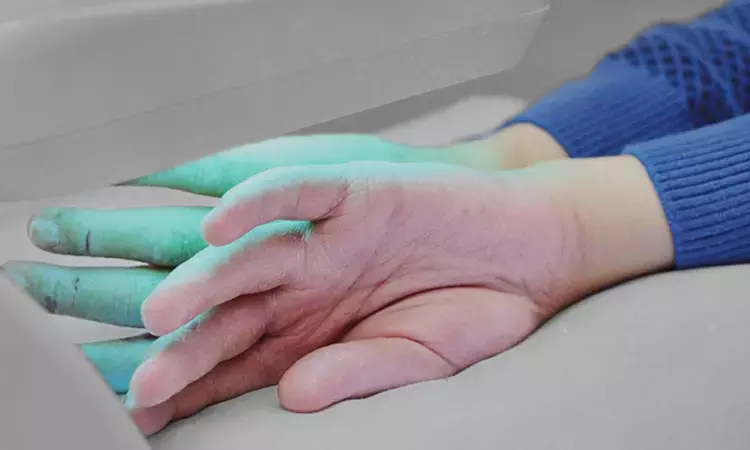- Home
- Medical news & Guidelines
- Anesthesiology
- Cardiology and CTVS
- Critical Care
- Dentistry
- Dermatology
- Diabetes and Endocrinology
- ENT
- Gastroenterology
- Medicine
- Nephrology
- Neurology
- Obstretics-Gynaecology
- Oncology
- Ophthalmology
- Orthopaedics
- Pediatrics-Neonatology
- Psychiatry
- Pulmonology
- Radiology
- Surgery
- Urology
- Laboratory Medicine
- Diet
- Nursing
- Paramedical
- Physiotherapy
- Health news
- Fact Check
- Bone Health Fact Check
- Brain Health Fact Check
- Cancer Related Fact Check
- Child Care Fact Check
- Dental and oral health fact check
- Diabetes and metabolic health fact check
- Diet and Nutrition Fact Check
- Eye and ENT Care Fact Check
- Fitness fact check
- Gut health fact check
- Heart health fact check
- Kidney health fact check
- Medical education fact check
- Men's health fact check
- Respiratory fact check
- Skin and hair care fact check
- Vaccine and Immunization fact check
- Women's health fact check
- AYUSH
- State News
- Andaman and Nicobar Islands
- Andhra Pradesh
- Arunachal Pradesh
- Assam
- Bihar
- Chandigarh
- Chattisgarh
- Dadra and Nagar Haveli
- Daman and Diu
- Delhi
- Goa
- Gujarat
- Haryana
- Himachal Pradesh
- Jammu & Kashmir
- Jharkhand
- Karnataka
- Kerala
- Ladakh
- Lakshadweep
- Madhya Pradesh
- Maharashtra
- Manipur
- Meghalaya
- Mizoram
- Nagaland
- Odisha
- Puducherry
- Punjab
- Rajasthan
- Sikkim
- Tamil Nadu
- Telangana
- Tripura
- Uttar Pradesh
- Uttrakhand
- West Bengal
- Medical Education
- Industry
Atopic Dermatitis: Ultraviolet B phototherapy not tied to increased risk of skin cancer

Taiwan: A recent population-based retrospective cohort study found no association between ultraviolet B phototherapy and an increased skin cancer risk among patients with atopic dermatitis (AD). The findings were published online in the Journal of the American Academy of Dermatology.
In the cohort study evaluating 6205 AD patients with 11.0 years of follow-up, UV-B phototherapy did not raise the risk of skin cancer, nonmelanoma skin cancer (NMSC), or melanoma. The researchers also assessed the number of UV-B phototherapy sessions, and each exposure did not increase the risk of melanoma, skin cancer, or NMSC among AD patients.
Atopic dermatitis is a chronic inflammatory skin disease with characteristics of chronic and relapsing clinical course, pruritus, and age-related distribution of eczematous lesions. It is one of the most common skin diseases, with a prevalence of 5% among adults and 20% among children. AD hurts interpersonal relationships, school performance and work.
UV-B phototherapy is a treatment modality commonly used for patients with atopic dermatitis. Chronic UV exposure is the most critical risk factor for skin cancer. Therefore, when choosing treatment, the long-term safety of UV-B phototherapy is a major concern for clinicians and patients.
Still, no studies have been performed regarding its long-term safety in terms of cutaneous carcinogenic risk. Hon-Yen Wu, National Yang-Ming Chiao Tung University, Taipei City, Taiwan, and colleagues aimed to investigate the skin cancer risk among patients with AD receiving UV-B phototherapy.
For this purpose, they conducted a population-based cohort study from 2001 to 2018 to determine UV-B phototherapy risk for skin cancer, cutaneous melanoma, and nonmelanoma skin cancer in AD patients.
The study led to the following findings:
· Among 6205 patients with AD, the skin cancer risks (adjusted hazard ratio [HR], 0.91), nonmelanoma skin cancer (adjusted HR, 0.80), and cutaneous melanoma (adjusted HR, 0.80) did not increase among patients with AD treated with UV-B phototherapy, compared with those who did not receive UV-B phototherapy.
· The number of UV-B phototherapy sessions was not associated with an increased risk of skin cancer (adjusted HR, 0.99), nonmelanoma skin cancer (adjusted HR, 0.99), or cutaneous melanoma (adjusted HR, 0.94).
The main limitation of the study was its retrospective design.
"Neither UV-B phototherapy nor the number of UV-B phototherapy sessions were linked to an increased risk of skin cancers among patients with atopic dermatitis," the researchers concluded.
Reference:
Ko, M., Tsai, W., Tsai, P., Hsu, L., Chien, K., & Wu, H. (2023). Ultraviolet B phototherapy does not increase the risk of skin cancer among patients with atopic dermatitis: A population-based retrospective cohort study. Journal of the American Academy of Dermatology, 89(3), 496-503. https://doi.org/10.1016/j.jaad.2023.05.037
Dr Kamal Kant Kohli-MBBS, DTCD- a chest specialist with more than 30 years of practice and a flair for writing clinical articles, Dr Kamal Kant Kohli joined Medical Dialogues as a Chief Editor of Medical News. Besides writing articles, as an editor, he proofreads and verifies all the medical content published on Medical Dialogues including those coming from journals, studies,medical conferences,guidelines etc. Email: drkohli@medicaldialogues.in. Contact no. 011-43720751


